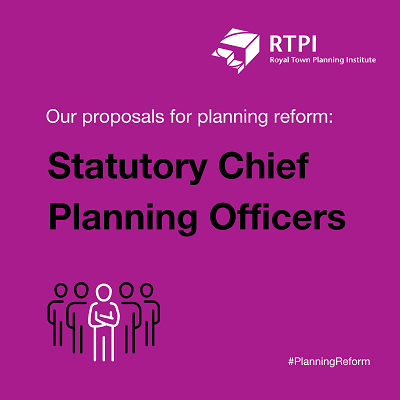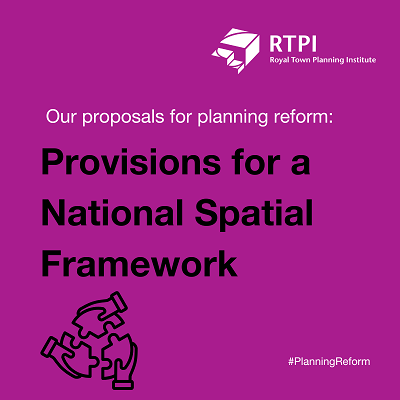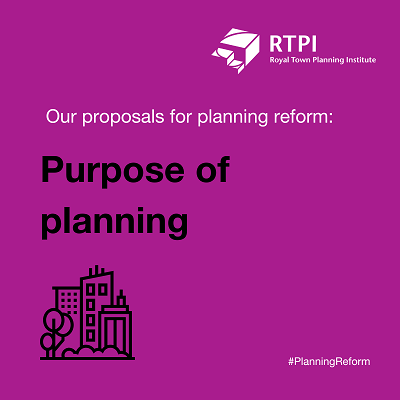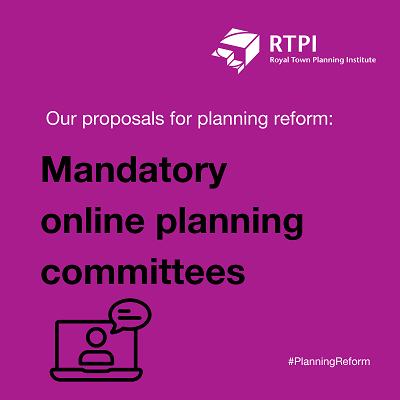Ahead of the publication of the Planning and Infrastructure Bill, the RTPI wishes to set out some key legislative asks of Government on behalf of the planning profession.
Our key asks:
- Statutory Chief Planning Officers
- Provisions for a National Spatial Framework
- The inclusion of a purpose of planning in the Bill
- Mandatory requirement for the provision of hybrid and online planning committees
Legislative ask 1: Statutory Chief Planning Officers

RTPI research has shown that just 23% of LPAs have a head of planning service reporting directly into the council’s Chief Executive and 9% of councils had no clear ‘head of planning service.’ Without a place in councils’ senior leadership teams, planners are less able to complete the difficult work of delivering local plans, or to take on more delegated decisions and train up officers to use tools like strategic planning, land assembly, digital transformation and design that are required to get Britain building.
This model was adopted in Scotland in April 2024 with new guidance published to clarify the post’s role and responsibilities. Any regulations should also mandate Chartership as the important basis for qualification, ongoing training and professional and ethical standards.
The RTPI wants to see the Planning and Infrastructure Bill introduce a statutory chief planning role following the model used in Scotland or proposed by the Minister during the Levelling Up and Regeneration Act (NC97 at LURB report stage).
Legislative ask 2: Ensure legislative proposals have cross-departmental buy-in through a National Spatial Framework

To achieve the Government’s growth agenda, existing, emerging and intersecting plans and systems need to be working in full alignment. We hope the impending parliamentary scrutiny period ensures thorough consideration and buy-in across parliament, helping MPs make a direct connection between the Bill and the future vision for their respective constituencies and in the preparation of future plans and strategies. This will include infrastructure and growth plans, environmental and land use strategies and industrial strategies.
The RTPI believes that the development of a National Spatial Framework will serve several purposes, including:
- Promoting integration between priorities across different government departments and agencies;
- Directing investments and coordinating between funding streams;
- Providing a place-based perspective for the proposed National Industrial Strategy, Local Growth Plans and the Land Use Framework;
- Coordinating between local, regional and national planning.
Legislative ask 3: The inclusion of a purpose of planning in the Bill

Low public understanding and negative perceptions of planning have a negative impact on planners’ wellbeing, undermine public trust in our plan-led system and have driven mis- and dis-information in local planning committees. The inclusion of a statutory purpose of planning in the Planning and Infrastructure Bill would be a way to improve such issues and benefit the general public’s understanding of the planning system, alongside all stakeholders who engage in planning.
This approach was successfully promoted by the RTPI into the Planning (Scotland) Act 2019 where a purpose of planning is set out on the face of the Act “…to manage the development and use of land in the long-term public interest.”
Legislative ask 4: Mandatory requirement for the provision of online planning committees

Previously the RTPI has advocated for the modernisation of planning committees. This has included examining how hybrid or virtual planning committee models might help open the planning process up to a more diverse and inclusive range of people. RTPI research suggests that virtual committees can help a younger, more diverse audience to engage with planning, as significant numbers - just under half (49%) - of the general public told us that having the ability to respond digitally would make them more likely to get involved. This move would be strongly supported by planners, 88% of whom believed they worked ‘well’ or ‘very well’ during the pandemic. The Local Government Association also found “a range of benefits” of virtual planning committee meetings.
Whilst the RTPI is clear that Elected Members should be physically present at committee meetings, providing an online offering to view planning committees could have a transformative impact on public interaction with our planning system.
As noted above a separate Working Paper has been published by MHCLG around planning committees which have submitted a formal response to. This is a separate proposal but should be considered alongside the other suite of changes.